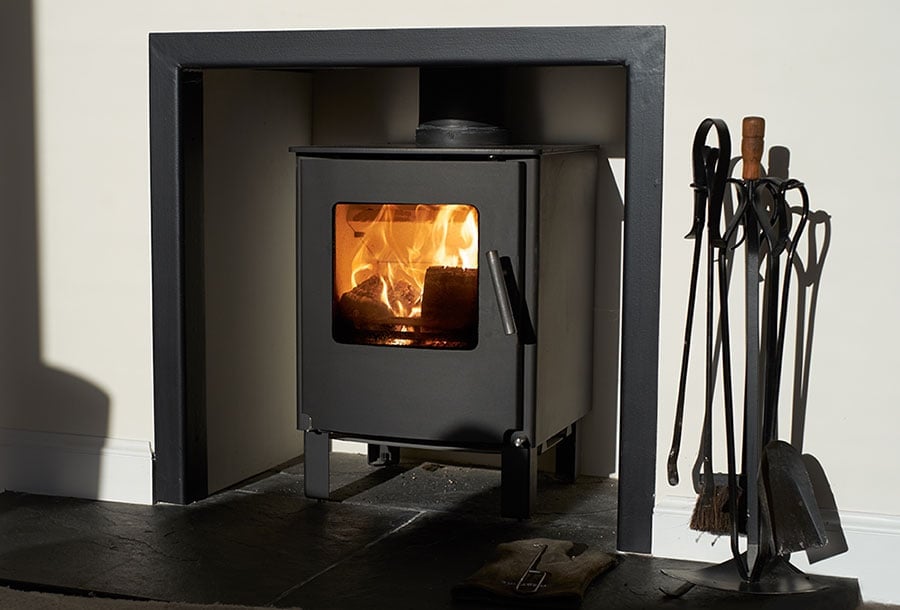More than 1 million families in the UK rely on wood burners to warm their homes during the winter months. In an attempt to reduce pollution and create cleaner air, the UK government announced that polluting fuels burnt on open fires and household stoves will be phased out.
The coal and wet wood ban in a nutshell
The government promotes the move to dry wood and manufactured solid fuels. They produce significantly less smoke than wet firewood and coal, and in-turn, reduce harm for both the environment and our health.
Why has the government put a ban on burning wet wood and house coal?
Speaking to the Huffington Post, George Eustice, Secretary of State for Environment, explained that the fumes created by burning fuel such as house coal and wet wood are “the biggest source of the most harmful pollutant that is affecting people in the UK.”
Michael Gove added that “strong, urgent” action is needed.
The Clean Air Strategy 2019 report states that “The government’s objective is to raise awareness of the potential impacts of air pollution at home and ensure that consumers are armed with reliable information enabling them to make informed choices to protect themselves, their families and their neighbours.”
So, in May 2021, new regulations came into force to restrict the sale of house coal and wet wood for household burning.
Are wood burners going to be banned?
Wood burning stoves themselves will not be banned. Selling certain types of fuel such as wet firewood and house coal have been phased out in a bid to encourage customers to adopt less-polluting fuels.
In addition, regulations that came into force in January 2022 ruled that new stoves that are manufactured have to meet certain environmental standards. Only stoves that meet these new standards are now available in stores. The stove industry has been cooperating with the government to implement the changes and stoves that have been approved are labelled with an ‘Ecodesign’ sticker.
Defra has collated a list of the current approved stoves.
In an interview with the Telegraph, Dennis Milligan, from Stove Industry Alliance, explains that older stoves are more harmful to the environment. Those manufactured 10 or more years ago release 80% more emissions than stoves being manufactured today. If you do not want to buy a new stove, using a filter can also make a huge difference. Recent research reveals that Electrostatic filters can cut emissions of fine particles by up to 92%.
It is also important to check the stove’s efficiency rating before making a purchase. These eco-designed stoves are 80% efficient as opposed to 60% in 2008, meaning consumers are getting more heat for their money.
Why is wet firewood bad for the environment?
The smoke that wet logs produce releases more than two times the amount of smoke emissions than that from seasoned or dry wood.
The smoke released does not only reduce air quality but also creates knock-on serious health effects. “Wood and coal burning account for 40% of harmful levels of background PM2.5 in the UK,” says John Maingay, spokesman for the British Heart Foundation. This is more particles per hour than a diesel truck, according to a report by the Department for Environmental, Food and Rural Affairs.
Not only does burning the harmful fuel result in serious harm for both our health and the environment, but the build-up of ash and chemicals in the chimneys can result in fire. In the UK each year there are 7,000 chimney fires.
Steps to take if you have a woodburner in your home:
- Make the switch from coal or wet wood to dry wood or manufactured solid fuels
- Make sure to buy an approved eco-friendly stove when buying new
- Make your current stove more eco-friendly by using a filter
- Ensure that your chimney is regularly swept to reduce the risk of fire
For more ways to live a more eco-friendly lifestyle, read our helpful sustainable living guide.
TAKE CONTROL OF YOUR FLEETS FUEL
Ready to start fuelling your business' success?
Steamline your fleet operations, control costs, and experience the benefits of Certas Energy Fuel Cards. Get in touch to start saving today.




